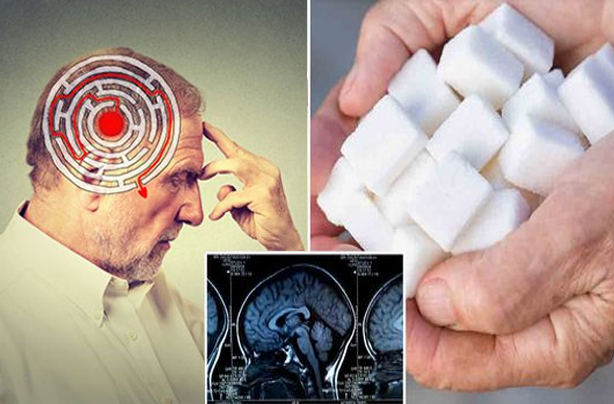Scientists Reveal The Direct Link Between Sugar And Alzheimer’s Disease
Alzheimer’s disease, also known as senile dementia, is a type of dementia that causes problems with memory, thinking and behavior. Symptoms usually develop slowly and get worse over time, becoming severe enough to interfere with daily tasks. Alzheimer’s is the most common form of dementia, a general term for memory loss and other cognitive abilities serious enough to interfere with daily life. Alzheimer’s disease accounts for 60 to 80 percent of dementia cases. Alzheimer’s is not a normal part of aging.

The greatest known risk factor is increasing age, and the majority of people with Alzheimer’s are 65 and older. But Alzheimer’s is not just a disease of old age. Approximately 200,000 Americans under the age of 65 have younger-onset Alzheimer’s disease. Alzheimer’s is a progressive disease, where dementia symptoms gradually worsen over a number of years.
In its early stages, memory loss is mild, but with late-stage Alzheimer’s, individuals lose the ability to carry on a conversation and respond to their environment. Alzheimer’s is the sixth leading cause of death in the United States. Those with Alzheimer’s live an average of eight years after their symptoms become noticeable to others, but survival can range from four to 20 years, depending on age and other health conditions.
Symptoms:
The most common early symptom of Alzheimer’s is difficulty in remembering newly learned information because Alzheimer’s changes typically begin in the part of the brain that affects learning. People with memory loss or other possible signs of Alzheimer’s may find it hard to recognize they have a problem. Signs of dementia may be more obvious to family members or friends.
Here’s How Sugar Can Contribute To Alzheimer’s Disease:

High-carb diets, and the attendant high blood sugar, are associated with cognitive decline. In recent years, Alzheimer’s disease has occasionally been referred to as “type 3” diabetes, though that moniker doesn’t make much sense. After all, though they share a problem with insulin, type 1 diabetes is an autoimmune disease, and type 2 diabetes is a chronic disease caused by diet. Instead of another type of diabetes, it’s increasingly looking like Alzheimer’s is another potential side effect of a sugary, Western-style diet.
In some cases, the path from sugar to Alzheimer’s leads through type 2 diabetes, but as a new study and others show, that’s not always the case. A research found that people with high blood sugar had a faster rate of cognitive decline than those with normal blood sugar—whether or not their blood-sugar level technically made them diabetic. In other words, the higher the blood sugar, the faster the cognitive decline.

An abnormally high blood sugar level, or hyperglycaemia, is a well-known characteristic of diabetes and obesity, and it is already understood that diabetes patients have an increased risk of developing Alzheimer’s, where abnormal proteins aggregate to form plaque and tangles in the brain. Scientists have unravelled the specific molecular link between glucose and Alzheimer’s disease, suggesting people who consumer a lot of sugar but are not diabetic are at increased risk.
Alzheimer’s, an enzyme called MIF (macrophage migration inhibitory factor) is damaged by a process called Glycation. Inhibition and reduction of MIF activity caused by Glycation could be the “tipping point” in disease progression.
